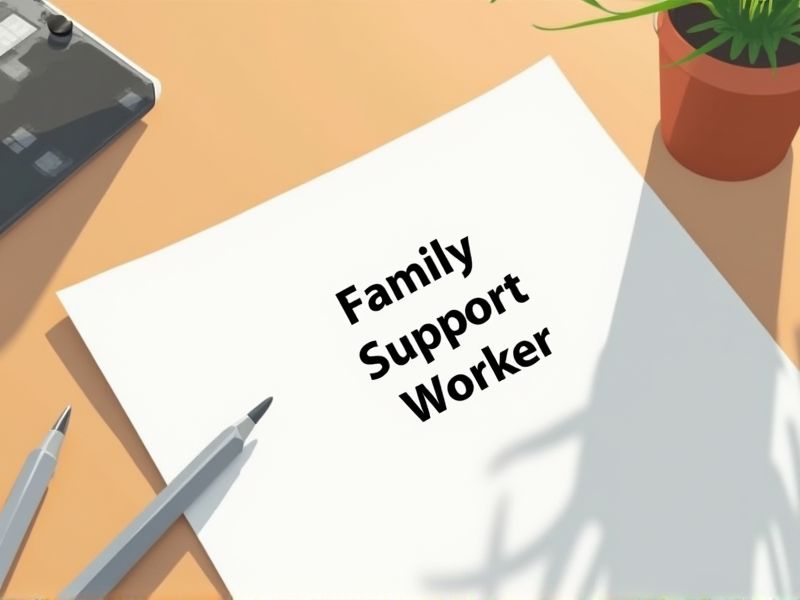
Family Support Workers play a pivotal role in enhancing family dynamics and ensuring the well-being of children and parents. Possessing certain certifications verifies their understanding of developmental, emotional, and social challenges families may encounter. These credentials also provide a framework for ethical practice and effective intervention. Here are key certifications that could be essential for a Family Support Worker.
CPR/First Aid Certification
CPR/First Aid Certification equips family support workers with the skills to respond to emergencies, increasing safety for families they assist. Acquiring certification enhances trust between workers and families, as they demonstrate readiness to handle health crises. In high-stress situations, trained workers can minimize injury or fatalities, providing timely interventions. Certification compliance often aligns with organizational and legal requirements, ensuring consistent and professional family support services.
Mental Health First Aid Certification
Mental Health First Aid Certification equips family support workers with the skills to recognize and respond to mental health issues, enhancing their ability to assist clients effectively. This certification improves their confidence in handling emergency situations, reducing the risk of harm to clients in crisis. With this training, support workers can better connect individuals to appropriate professional resources, promoting timely intervention and recovery. Knowledge gained through certification also contributes to creating a supportive environment, fostering trust and openness between workers and families.
Certified Family Life Educator (CFLE)
Family Support Workers benefit from CFLE certification because it ensures they have comprehensive knowledge of family dynamics and developmental stages. This certification enhances their ability to provide effective support and education tailored to diverse family needs and challenges. By understanding evidence-based strategies, CFLE-certified workers are better equipped to promote healthy family relationships and prevent crises. Employers often prioritize CFLE credentials as they signal a commitment to professional standards and continuous learning.
Crisis Intervention Training
The presence of Crisis Intervention Training equips Family Support Workers with skills to de-escalate potentially volatile situations, thereby ensuring the safety of both families and the workers themselves. This type of training enhances the workers' ability to identify signs of acute distress or mental health crises, allowing for quicker and more effective responses. Training significantly improves the collaboration between Family Support Workers and mental health professionals, creating a more comprehensive support network for families. The ability to manage crises efficiently reduces long-term negative outcomes for families, fostering a more stable environment for both children and adults.
Trauma-Informed Care Certification
Family Support Workers often encounter clients with traumatic histories, and certification in Trauma-Informed Care equips them with the knowledge to recognize signs of trauma. This certification provides essential skills to respond sensitively, reducing the risk of re-traumatization. Understanding trauma's impact can improve client-worker relationships, facilitating better outcomes. Certification enhances professional credibility and ensures adherence to best practice standards in client care.
Child Abuse Prevention and Reporting Certification
Child abuse prevention and reporting certification is essential for a family support worker because it equips them with the knowledge to recognize signs of abuse. By understanding legal obligations and proper procedures, workers are better prepared to act promptly and protect children from harm. Certification enhances the credibility and trustworthiness of the support worker in their professional capacity. Well-informed workers contribute to a safer and more supportive environment for families they assist.
Domestic Violence Awareness Certification
Domestic Violence Awareness Certification equips family support workers with the necessary skills to identify signs of abuse, ensuring early intervention and support for victims. This certification increases a worker's ability to provide informed guidance and resources, promoting safety and empowerment for affected families. It also enhances the worker's credibility and competence, leading to greater trust and cooperation from those they assist. Its necessity stems from the critical role family support workers play in breaking the cycle of abuse and fostering healthier family environments.
Cultural Competency Training Certification
Cultural competency training certification equips family support workers with the skills necessary to navigate diverse family dynamics and cultural differences effectively, which can lead to more successful outcomes in support and intervention efforts. This training enhances their ability to communicate sensitively and build trust with families from various backgrounds, reducing potential misunderstandings and conflicts. Certification assures families and employers that a worker has met specific standards and possesses the knowledge to address cultural factors in family dynamics. As populations become increasingly diverse, this form of education becomes crucial for providing equitable and effective support services.
Certified Parent Educator (CPE)
Certified Parent Educators (CPE) provide evidence-based parenting information, enhancing the skill set of Family Support Workers. With specialized training, CPEs improve the effectiveness of parenting interventions, leading to better family outcomes. Their expertise aids in crafting personalized support plans, addressing unique challenges faced by families. Families receive increased trust and assurance when Family Support Workers collaborate with certified professionals, fostering a more robust support network.
Substance Use Disorder Awareness Certification
The Substance Use Disorder Awareness Certification equips family support workers with a deeper understanding of addiction, ensuring effective, empathetic interactions with clients. A certified worker can more accurately identify signs of substance use disorder, enhancing early intervention opportunities and potentially improving outcomes. This certification strengthens the worker's ability to connect families with appropriate resources, facilitating better access to treatment and support services. Enhanced knowledge of substance use disorders also bolsters credibility and trust between the support worker and families, fostering a more supportive and informed environment.
Summary
When you pursue certifications as a Family Support Worker, you increase your employability and potential for higher salary. Certifications enhance your skills, enabling you to provide more effective support to families. Your credibility and professional standing improve, leading to greater trust from clients and employers. Equipped with specialized knowledge, you significantly contribute to positive family outcomes and community well-being.
